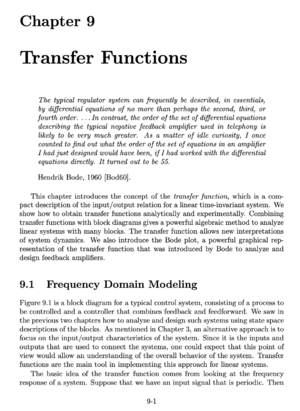Difference between revisions of "Transfer Functions"
Jump to navigation
Jump to search
Tag: Undo |
|||
| Line 8: | Line 8: | ||
|Chapter contents=# The Loop Transfer Function | |Chapter contents=# The Loop Transfer Function | ||
# The Nyquist Criterion | # The Nyquist Criterion | ||
| + | #* The Nyquist Plot | ||
| + | #* The General Nyquist Criterion | ||
| + | #* Conditional Stability | ||
# Stability Margins | # Stability Margins | ||
# Bode's Relations and Minimum Phase Systems | # Bode's Relations and Minimum Phase Systems | ||
# Generalized Notions of Gain and Phase | # Generalized Notions of Gain and Phase | ||
| + | #* System Gain and Passivity | ||
| + | #* Extensions of the Nyquist Criterion | ||
| + | #* Describing Functions | ||
# Further Reading | # Further Reading | ||
:: Exercises | :: Exercises | ||
}} | }} | ||
Latest revision as of 16:36, 24 November 2024
| Prev: Output Feedback | Chapter 9 - Transfer Functions | Next: Frequency Domain Analysis |
This chapter introduces the concept of the transfer function, which is a com- pact description of the input/output relation for a linear time-invariant system. We show how to obtain transfer functions analytically and experimentally. Combining transfer functions with block diagrams gives a powerful algebraic method to analyze linear systems with many blocks. The transfer function allows new interpretations of system dynamics. We also introduce the Bode plot, a powerful graphical rep- resentation of the transfer function that was introduced by Bode to analyze and design feedback amplifiers.
Contents
- The Loop Transfer Function
- The Nyquist Criterion
- The Nyquist Plot
- The General Nyquist Criterion
- Conditional Stability
- Stability Margins
- Bode's Relations and Minimum Phase Systems
- Generalized Notions of Gain and Phase
- System Gain and Passivity
- Extensions of the Nyquist Criterion
- Describing Functions
- Further Reading
- Exercises
